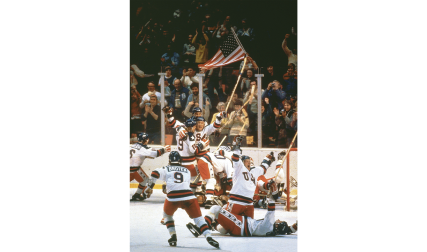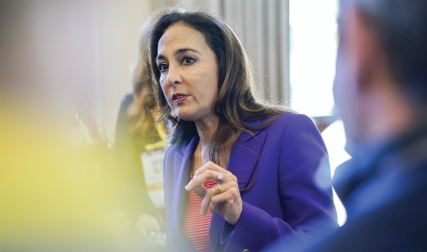The Adams Family
Classes such as professor J.C. Adams’ [“Awakening,” March/April] were the reason most of us went to Dartmouth—to learn from an extraordinary professor teaching an undergraduate course. His lectures were riveting. His presence dominated the room, and he made you feel in the moment. It was an indelible experience I savor 63 years later. And, yes, he was a tough grader.
Frederick M. Lione Jr. ’55
Norwalk, Connecticut
In the winter of 1960, I took the same class that Joe Gleason ’77 wrote about. Fifty-eight years later I vividly remember it as my favorite course at Dartmouth.
In my time, Adams’ curly hair was only beginning to gray. No cane. He wore regular, not dark, glasses. He used 3-by-5 cards. He periodically nibbled on nuts or seeds as he spoke. He remained seated throughout his lecture.
My recollection of Adams’ voice is the same as Joe’s. Every student—about 80 upperclassmen—sat up straight and hung on his every word. For every class. He spoke solemnly. We paid such rapt attention you could have heard a pin drop.
I studied like mad for the final, trying to remember every fact and nuance he had exposed me to. In previous years his finals had consisted of several difficult questions. This time there was only one: “Write the history of the German Army from 1919 to 1945.” When the test was passed out, the entire class let out a resounding moan.
I got a C+ on the final and in the course. I was pleased. Later I learned to speak German and Russian and have read more modern European history than I have of any other subject—because of Adams, what he taught and because he inspired me. I still have the textbook on my bookshelf at home (with my underlines in green ink).
Bill Wood ’61
Menlo Park, California
I first ran into Professor Adams in his European survey courses in 1958. As a history major, I took as many of his classes as I could. I still remember his exam question: “Whether under tsars or commissars, the foreign policy of Russia has always been the same. Explain.” He was tough and fair. Gleason captured the essence of studying under his teaching. Thanks for the memories.
Ralph Parady ’61
Cape Elizabeth, Maine
The essay about Adams accurately recalls a commanding classroom presence in his last year, but it misses Adams’ main contributions to his profession. His book Flight in Winter, about the Serbs in World War I, demonstrated his mastery of multiple languages and his fine prose style, both of which he encouraged in his classes.
I took every course he taught, including his most challenging seminar, and I began to study Russian in fall 1955. When Sputnik shocked the world in October 1957, I felt even more grateful he had helped me find my career as a historian of modern Russia.
Interestingly, Adams somehow understood we wanted to know his thoughts about Sputnik. He showed up on the steps of College Hall and somehow, in the age of no twittering, dozens of students gathered to listen to his thoughts about its implications.
E. Willis Brooks ’57
Chapel Hill, North Carolina
I majored in history, took Adams’ modern European history course in the late 1950s and was mesmerized by his lectures. I will never forget his lecture that focused on the Nazis at the outbreak of World War II.
We came into the lecture hall to find Adams seated at his desk in the front. Arrayed on it we saw a Nazi flag, a German helmet and a large bronze swastika mounted upright. We settled in for the lecture. Adams said nothing. Finally, there was total silence with all eyes on him and the display on his desk. Adams put both of his hands palms down on the desk, surveyed the room and intoned in his deep baritone voice: “Yes, gentlemen, it really happened….”
I will never forget that moment.
Earle J. Patterson ’60
Kennebunk, Maine
I appreciated President Hanlon’s comments about hands-on research [“The President,” March/April] and the article about Professor Adams. They reminded me of my most challenging assignment at Dartmouth. In a religion class, professor Charles Stinson required that we write our term papers on a historical religious figure using only original sources. Thus began my reading of St. Augustine and my decision to become an Episcopal priest. Some 40 years later I still appreciate knowing Augustine’s humanity, struggles, thought and theology. They led me to George Herbert, Jeremy Taylor, John Donne and the Anglican divines. All this for a boy who came to Dartmouth to row!
Thad Bennett ’76
Conway, Massachusetts
Dollars and Sense
Mr. Weatherley-White’s case for impact investing is very attractive [“The Impact Investor,” March/April]. Unfortunately, the author weakens his case to a certain extent by relying on the contention that maximized profits lead to increased social welfare, a relationship that does not seem to have been constant throughout history. While similar efforts in the past (the Rockefellers’ International Basic Economy Corp. comes to mind) have often fallen short of their objectives, the tide may have changed, and it’s certainly worth another try or three.
Bill Schaill ’66
St. Petersburg, Florida
Rago Remembered
I enjoyed your poignant article about Joe Rago ’05 [“No Ordinary Joe,” January/February]. I didn’t know much about him, other than occasionally reading his newspaper articles. I read the entire article. It was a beautiful tribute to an incredible person.
Tom Chapman
Chillicothe, Missouri
Ravine Raving
How can one possibly give enough thanks to author Jim Collins ’84 for his beautiful history [“Welcome to the Woods,” January/February] about the new Ravine Lodge. It is more than a tale of planning and construction, logs and granite. It is a love story about how talented men and women tuned to the special link between the College, its students, nature and a beloved cabin wrought something that honors a past and assures a future, all while representing and preserving the essence and the best of Dartmouth.
Dave Tucker ’66
San Francisco
Fake News!
Speaking of fake news [“Eureka,” March/April], why is it interesting that a professor at an institution where 95 percent of the faculty regularly vote for Democrats finds the most frequent consumers of fake news are older Trump supporters. And, by the way, the evaluation of what is fake news is clearly subjective. What is fake news is this study.
Stephan Lanfer ’66
Yarmouth, Maine
“Sobering”
Alexander Gardner [“The Art of War,” March/April] is probably most famous for his series of plates “The Hanging of the Lincoln Conspirators,” considered by many to be pivotal in the birth of photojournalism.
The images are worth observing for their sheer rawness. They begin with portraits of the condemned taken during the trial and follow them to their execution, capturing the reading of death warrants and the adjusting of nooses. The series ends with a shot of four coffins beside graves near the gallows where they would have easily been seen by the condemned on the scaffold. A sobering collection. Dartmouth pulled a coup getting Gardner’s work.
Eric Overton ’87, Th’89
Round Rock, Texas
Matter of Degrees
The story of the success and perseverance of Dr. Hayes-Jordan ’87, DMS’91 [“Lifesaver,” March/April], from childhood to national distinction, contains a victimhood anecdote. However, her Ivy League college and med school degrees, her fellowship at the world-renowned University of Toronto and her University of Texas professorship are not the story of victimhood. To have had to “settle” for a pediatric surgery training program in Toronto is hardly pejorative. In my experience as the former program director of a nationally competitive specialty residency, nationwide racism would be an unusual reason to reject a candidate of her distinction.
Richard L. Saunders
Winter Park, Florida
A Proud American
I listened to Yale history professor Timothy Snyder’s podcast on “The Evil of America First” to be sure his quote “ ‘America First’ is Deutschland über alles translated into American English” [“Visiting Voices,” March/April] was not out of context. Rather it was out of left—pun intended—field.
The real danger to our freedom is the increasing control of our lives by people who think they know what’s best for us and the gradual erosion of our rights, starting with the freedom to think and worship as we please. Whenever anyone disagrees with these supposed intellectuals, the race, gender or xenophobic card is played because it’s easier than using the truth—they are all for free speech as long as you agree with them.
The world is a hostile, competitive place. Putting your country (or family) first means looking out for its best interests. Heaven forbid. My parents immigrated to the USA because they wanted the opportunity for a better life, and they got it by not blaming others but by working hard. America first? Damn right.
John Lallis ’69
Gladstone, New Jersey
Undying
Dartmouth is a unique American educational institution, high ranking, yet small enough so that at least in my day one got to know every classmate’s face. Hanover and the College are simply too small to expand willy-nilly [“Campus,” March/April]. Concentrate on teaching, quality research and small class sizes and it will be here forever.
Harold E. Welch ’63
Clandeboye, Manitoba, Canada
The article on College Park [“A History of College Park,” March/April web extra] was excellent and much appreciated. Elaboration of the College’s history is a great subject for the alumni magazine.
Adam T. Block ’57, Tu’58
Reston, Virginia



